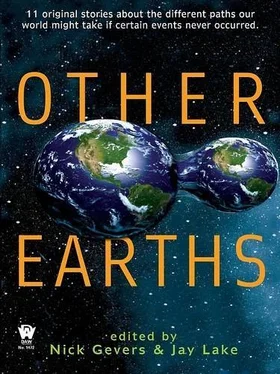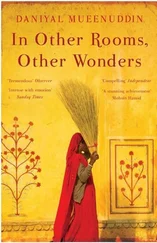The most wondrous object in the room was a kind of loom, rank upon rank of knotted string that stretched from floor to ceiling and wall to wall—but unlike a loom it was extended in depth as well. As she peered into this array, she saw metal fingers pluck blindly at the strings, making the knots slide this way and that.
Dreamer watched her, as she watched the string. “I’m starting to think Alphonse is using the language classes as an excuse to keep me away from you. Perhaps the prince wants you for himself. Who wouldn’t desire such beauty?”
Jenny pulled her face at this gross flattery. “Tell me what this loom is for.”
“The Inca have always represented their numbers and words on quipus, bits of knotted string. Even after they learned writing from their Aztec neighbors, whom they encountered at the start of the Sunrise.”
“The Sunrise?”
“That is their modest name for their program of expansion across the world. Jenny, this is a machine for figuring numbers. The Inca use it to calculate their journeys across the world’s oceans. But it can perform any sum you like.”
“My father would like one of these to figure his tax return.”
Dreamer laughed.
She said, “But everybody knows that you can’t navigate at night, when the sun goes down, and the only beacons in the sky are the moon and planets, which career unpredictably all over the place. How, then, do the Inca find their way?” For the Europeans this was the greatest mystery about the Inca. Even the greatest seamen of the past, the Vikings, had barely had the courage to probe away from the shore.
Dreamer glanced at the strange charts on the wall. “Look, they made us promise not to tell any of you about—well, certain matters, before the Inca deem you ready. But there’s something here I do want to show you.” He led her across the room to the globe.
That blue shape was undoubtedly the Mediterranean. “It’s the world,” she breathed.
“Yes.” He smiled. “The Inca have marked what they know of the European empires. Look, here is Grand Bretagne.”
“Why, even Europe is only a peninsula dangling from the carcass of Asia.”
“You know, your sense of wonder is the most attractive thing about you.”
She snorted. “Really? More than my eyes and teeth and neck, and the other bits of me you’ve been praising? I’ll believe that when a second sun rises in the sky. Show me where you come from—and the Inca.”
Passing his hand over the globe, he made the world spin and dip.
He showed her what lay beyond the Ottoman empire, the solemn Islamic unity that had blocked Christendom from the east for centuries: the vast expanses of Asia, India, the sprawling empire of China, Nippon, the Spice Islands. And he showed how Africa extended far beyond the arid northern regions held by the Ottomans, a great pendulous continent in its own right that sprawled, thrillingly, right across the equator.
“You can in fact reach India and the east by sailing south around the cape of southern Africa,” Dreamer said. “Without losing sight of land, even. A man called Columbus was the first to attempt this in 1492. But he lacked the courage to cross the equator. Columbus went back to the family business of trouser-making, and Christian Europe stayed locked in.”
Now he spun the globe to show her even stranger sights: a double continent, far to the west of Europe across the ocean, lands wholly unknown to any European. The Inca had come from a high country that ran north to south along the spine of the southernmost of the twin continents. “It is a place of mountains and coast, of long, long roads, and bridges centuries old, woven from vines, still in use …”
Around the year 1500, according to the Christian calendar, the Inca’s greatest emperor Huayna Capac I, had emerged from a savage succession dispute to take sole control of the mountain empire. And under him, as the Inca consolidated, the great expansion called the Sunrise had begun. At first the Inca had used their woollen-sailed ships for trade and military expeditions up and down their long coastlines. But gradually they crept away from the shore.
At last, on an island that turned out to be the tip of a grand volcanic mountain that stuck out of the sea, they found people. “These were a primitive sort, who sailed the oceans in canoes dug out of logs. Nevertheless, they had come out of the southeast of Asia and sailed right to the middle of the ocean, colonizing island chains as they went.” The Inca, emboldened by the geographical knowledge they took from their new island subjects, set off west once more, following island chains until they reached southeast Asia. All this sparked intellectual ferment, as exploration and conquest led to a revolution in sky watching, mathematics, and the sciences of life and language.
The Inca, probing westward, at last reached Africa. And when in the early twentieth century they acquired lodestone compasses from Chinese traders, they found the courage to venture north.
Jenny stared at the South Land. There was no real detail, just a few Inca towns dotted around the coast, an interior like a blank red canvas. “Tell me about your home.”
He brushed the image of the island continent with his fingertips. “It is a harsh country, I suppose. Rust-red, worn flat by time. But there is much beauty and strangeness. Animals that jump rather than run, and carry their young in pouches on their bellies. Don’t laugh, it’s true! My people have lived there for sixty thousand years. That’s what the Inca scholars say, though how they can tell that from bits of bone and shards of stone tools I don’t know. My people are called the Bininj-Mungguy, and we live in the north, up here, in a land we call Kakadu.”
Jenny’s imagination raced, and his strange words fascinated her. She drew closer to him, almost unconsciously, watching his mouth.
“We have six seasons,” he said, “for our weather is not like yours. There is Gunumeleng, which is the season before the great rains, and then Gudjewg, when the rain comes, and then Banggerreng—”
She stopped up his mouth with hers.
After a week’s sailing the Viracocha crossed the equator. Atahualpa ordered a feast to be laid for his senior officers and guests. They were brought to a stateroom that, Jenny suspected from the stairs she had to climb, lay just under the deck itself. Tonight, Atahualpa promised, his passengers would be allowed on deck for the first time since Londres, and the great secret that the Incas had been hiding would be revealed.
But by now Dreamer and Jenny had shared so many secrets that she scarcely cared.
While the Inca crew wore their customary llama-wool and cotton uniforms, George Darwin wore his clerical finery, Alphonse the powdered wig and face powder of his father’s court, and Jenny a simple shift, her Sunday best. Dreamer was just one of the many representatives of provinces of the Inca’s ocean-spanning empire aboard ship. They wore elaborate costumes of cloth and feather, so that they looked like a row of exotic birds, Jenny thought, sitting there in a row at the commander’s table.
In some ways Dreamer’s own garb was the most extraordinary. He was stripped naked save for a loin-cloth, his face-spiral tattoo was picked out in some yellow dye, and he had finger-painted designs on his body in chalk-white, a sprawling lizard, an outstretched hand. Jenny was jealously aware that she wasn’t the only woman who kept glancing at Dreamer’s muscled torso—and a few men did too.
The Inca went through their own equator-crossing ritual. This involved taking a live chicken, slitting its belly and pulling out its entrails, right there on the dinner table, while muttering antique-sounding prayers.
Bishop Darwin tried to watch this with calm appreciation. “Evidently an element of animism and the superstitious has survived in our hosts’ theology,” he murmured.
Читать дальше












